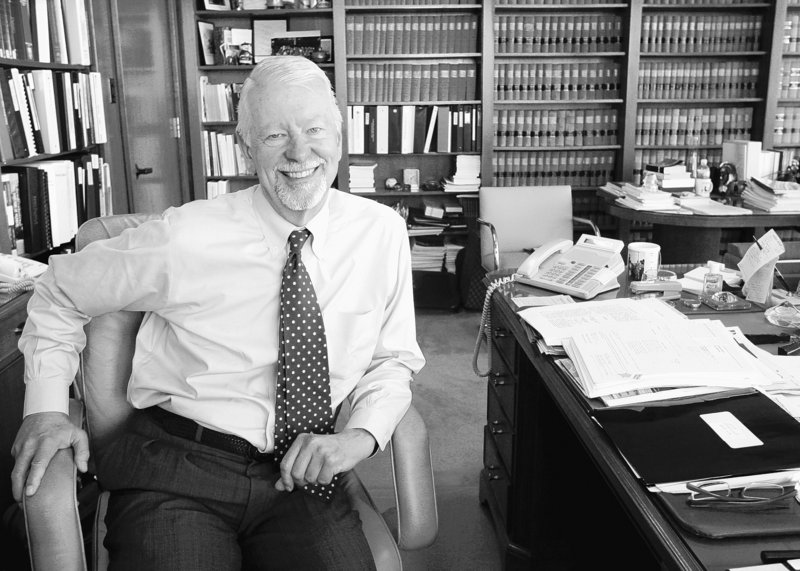SAN FRANCISCO – Back in 1987, President Ronald Reagan nominated a buttoned-down Republican lawyer named Vaughn Walker to a San Francisco federal judgeship, provoking one of the fiercest confirmation fights over a Bay Area federal judge in history.
San Francisco’s powerful civil rights organizations and Democratic leadership greeted Walker’s nomination with howls of protest. They branded him hostile and “insensitive” to gay and lesbian rights because of his representation of the U.S. Olympic Committee in a lawsuit against the Gay Olympics over the use of the Olympics brand.
The protests continued unabated for two years before Walker was finally confirmed during the first Bush administration.
Now, Walker is the toast of the gay community, the author this week of an unprecedented ruling striking down California’s ban on same-sex marriage because it violates the equal rights of gay and lesbian couples.
And he is a villain to conservative foes of same-sex marriage, who have branded him an “activist judge” and peppered the blogosphere with accusations that he is biased because he is gay, which has been known in San Francisco legal circles and among his colleagues for years.
In many respects, it is all vintage Walker. Irony and surprise have been hallmarks of his judicial career, an unpredictable journey chock full of rulings and developments that have defied any stereotype of a conservative Republican judge.
From blasting the federal government’s war on drugs during the 1990s to invalidating Proposition 8 on Wednesday, the silver-haired judge with the courtroom baritone has taken his iconoclastic streak and colored his often high-profile docket with it for more than two decades.
Gay rights lawyers almost sheepishly acknowledge that they once feared Walker. He was considered far from ideal even when he was randomly assigned last year to the legal challenge to voter-approved Proposition 8.
“There is no doubt that it is an irony on many levels that Walker’s very appointment to the bench was vigorously opposed by the LGBT community and lauded by conservatives,” said Kate Kendell, executive director of the National Center for Lesbian Rights.
Says a Republican San Francisco judge who knows Walker and declined to be identified, “Vaughn is in some respects a conservative thinker. But in many respects he’s a very independent thinker. He’s been very unpredictable, and probably more so now.”
The 66-year-old Walker, an Illinois native and chief judge for the Bay Area’s federal courts since 2004, declined to be interviewed for this story.
But even for a judge who has appeared to relish the spotlight during his judicial career, the Proposition 8 case has produced an unrivaled crush of attention. His every move during the historic January trial was dissected on websites across the country.
And now the case has put Walker’s sexual orientation into the public domain, with some conservative organizations saying he should have recused himself from the Proposition 8 trial.
Lawyers and judges who know Walker say he has never made his sexual preference public, but has not been secretive about it, either, sometimes attending events with a partner.
And the lawyers defending Proposition 8 have not raised the issue, either in public comments or in court papers.
One federal judge, who declined to be named, said he considered it “ironic” when Walker drew the lawsuit seeking to overturn the state’s same-sex marriage ban, but dismisses the suggestion he would be biased.
At the same time, the colleague observes: “I think he cares very deeply about this issue. It’s consistent with the way he’s handled other cases. He’s very assertive. He’s always been somebody who, if he has an opportunity to use the stage to make a point, he does do that.”
Walker has been known to hold strong libertarian views, but there has been nothing in his track record on civil rights cases that offered clear guidance to how he would rule on the federal equal protection challenge to Proposition 8.
If anything, civil rights lawyers have considered him fairly conservative in discrimination cases.
Walker has had ample opportunity to use his courtroom pulpit in major cases over the years.
He has declared the Bush administration’s wiretapping program unconstitutional, and presided over the antitrust trial challenging the Hearst Corp.’s bid to buy the San Francisco Chronicle, as well as the antitrust trial involving Oracle’s takeover of PeopleSoft.
He also oversaw one of Silicon Valley’s earliest major legal skirmishes between high-tech titans Apple Computer and Microsoft. Separately, he once told a legal newspaper he advocates legalizing drugs.
From this point on, however, Walker’s name will almost certainly be most closely associated with the legal fight over California’s gay marriage laws. The Republican once considered “insensitive” to gays and lesbians has become the judge who gave same-sex couples reason to believe they may get the right to marry.
“It just goes to show you,” said Eva Paterson, president of the Equal Justice Society and one of the Bay Area’s leading civil rights activists for decades.
“You just never know.”
Copy the Story Link
Send questions/comments to the editors.



Success. Please wait for the page to reload. If the page does not reload within 5 seconds, please refresh the page.
Enter your email and password to access comments.
Hi, to comment on stories you must . This profile is in addition to your subscription and website login.
Already have a commenting profile? .
Invalid username/password.
Please check your email to confirm and complete your registration.
Only subscribers are eligible to post comments. Please subscribe or login first for digital access. Here’s why.
Use the form below to reset your password. When you've submitted your account email, we will send an email with a reset code.